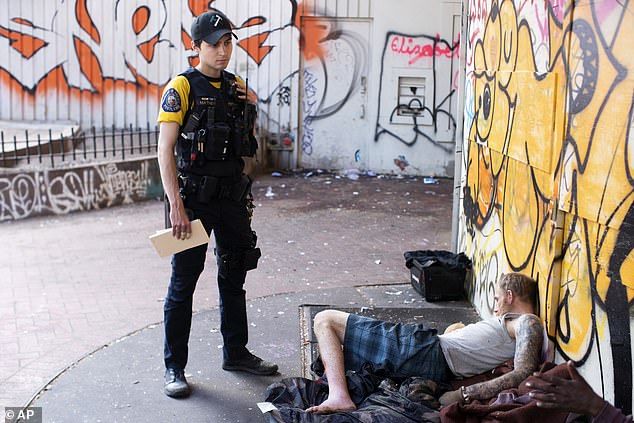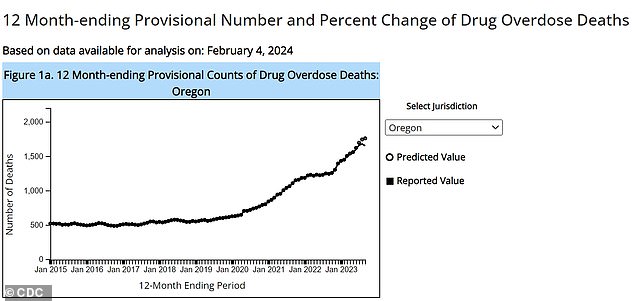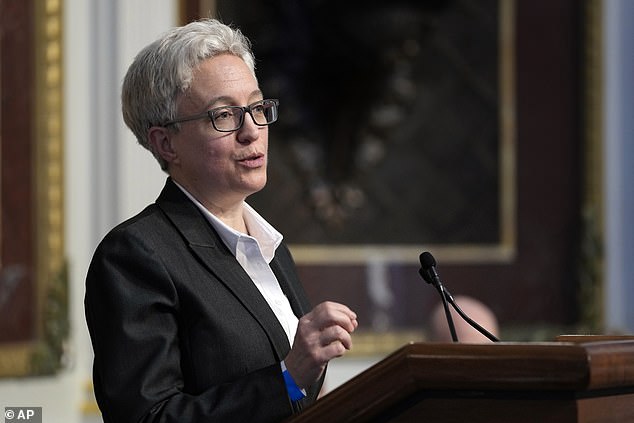Fentanyl possession has been made illegal again in Oregon after the state rushed to roll back laws that saw drug use and homelessness take over cities.
Oregon lawmakers passed a bill to recriminalize drug possession weeks after Gov. Tina Kotek declared a state of emergency over the fentanyl crisis in Portland.
A bill recriminalizing possession of small amounts of drugs passed the Oregon Legislature on March 1.
The original bill, called Measure 110, passed in 2020 and made possession of street drugs such as heroin, fentanyl and methamphetamine a non-criminal offense, similar to a parking ticket.
Oregon has seen a 210 percent increase in fentanyl-related deaths since the first decriminalization law passed.
In 2023, 16 children were exposed to fentanyl in the state and 539 children were exposed to the deadly drug nationwide, according to CATU2.

Fentanyl possession has been made illegal again in Oregon after a new bill was passed by lawmakers on March 1 (pictured: Officer Donny Mathew of the Portland Police Bureau’s bike squad stands next to a person who appears to have passed out )


Efforts by lawmakers come as governments struggle to respond to the deadliest overdose crisis in U.S. history. Oregon has seen a 210 percent increase in fentanyl-related deaths since the first decriminalization law passed in 2020
House Bill 4002 reverses an important part of the state’s narcotics decriminalization law, which was the first of its kind in the United States
Efforts from lawmakers come as governments are scrambling to respond to the deadliest overdose crisis in American history.
Oregon has seen a 190 percent increase in overdose deaths since the original decriminalization law took effect in February 2021, according to the CDC.
In the 12 months through February 2021, there were 861 overdose deaths in Oregon; this number rose to 1,650 deaths in the same 12-month period ending in September 2023.
When Oregon voters approved the landmark plan to decriminalize hard drugs three years ago, they thought an end to the incarceration of drug users would be good for the state and potentially spread across the country.
However, overdoses skyrocketed as the state struggled to fund the improved treatment centers at the heart of the decriminalization plan.
The pandemic further hurt downtown Portland, turning the streets into an open-air drug market.
The Oregon Poison Center has urged people to keep young children away from street drugs, and specifically fentanyl.
About 80 percent of children ages 1.5 to 16 were exposed to the deadly substance in their homes, according to state health officials.
The Portland Police Bureau reported in September 2023 that nine children had ingested fentanyl since June. Five of them died, and seven of them were under the age of six.


Oregon’s Democratic governor declared a state of emergency over the fentanyl crisis in Portland in late January. (Pictured: Chris, 28, spotted smoking crack in downtown Portland)


Oregon has seen a 190 percent increase in overdose deaths since the first decriminalization law went into effect in February 2021


The free drug market in Oregon has also caused the number of homeless people to increase. (Pictured: A homeless camp under the Morrison Bridge in Portland, Oregon in August 2023)
Fentanyl is 50 times more potent than heroin and can cause death or serious injury to children under the age of six, health officials said.
Now, even liberal politicians — like Oregon’s Democratic governor Tina Kotek — are ready to end the experiment before the drug crisis spirals further out of control.
The bill now awaits Kotek’s signature. In January, she said she is open to signing a bill that would roll back decriminalization.
The state Senate approved the new bill by a 21-8 vote after the House passed it 51-7.
On Thursday, Kotek said: ‘House Bill 4002 will require sustained action and commitment from state and local government to uphold the intent set forth by the Legislature: to balance treatment for individuals struggling with addiction and accountability.’
Oregon’s Democratic governor declared a state of emergency over the fentanyl crisis in Portland in late January.
“With this bill, we are doubling down on our commitment to making sure Oregonians have access to the treatment and care they need,” said Democratic Senate Majority Leader Kate Lieber of Portland, one of the bill’s authors.
She added that its passage will “be the start of real and transformative change for our justice system.”
The bill is expected to take effect on September 1 and would allow police to charge users with a misdemeanor crime that could see them in jail for up to 180 days.
The bill also aims to make it easier to prosecute people who sell drugs. It increases access to addiction medicine and to obtaining and maintaining housing without being discriminated against for using that medicine.
Under the current bill, police are only allowed to cite people for minor possession of street drugs, with the option of either paying a $100 fine or calling a substance abuse screening helpline.


Gov. Tina Kotek said in January she is open to signing a bill that would roll back decriminalization


The bill also aims to make it easier to prosecute people who sell drugs. It increases access to addiction medicine and to obtaining and maintaining housing without being discriminated against for using that medicine
Kotek, along with fellow Portland Mayor Ted Wheeler and Multnomah County Chairwoman Jessica Vega Pederson, issued the state of emergency.
The referred agencies to wworking with first responders to connect people addicted to the synthetic opioid with resources, including drug treatment programs and to crack down on drug sales.
In the 90 days following the declaration, Fentanyl addicts who interacted with first responders in downtown Portland were triaged by the new command center.
Staff at the center can connect addicts with a variety of resources, from a bed in a drug treatment center to meeting with a behavioral therapist to help sign up for food stamps.
“Our country and our state have never seen such a deadly addictive drug, and everyone is struggling with how to respond,” Kotek said.
Along with the bill, the Legislature approved a $2 million program that will educate children in kindergarten through 12th grade about fentanyl, along with a social media campaign about the drug’s dangers, Oregon Live reported.
The helpline from the previous bill will still be available, although it was rarely used over the years.
Tera Hurst, the executive director of the Oregon Health Justice Recovery Alliance, the group that supported Measure 110, said parts of the original bill will remain “intact.”
Much of Measure 110 was funded by the Drug Policy Alliance, an organization based in New York that advocates for drug decriminalization.
Kellen Russoniello, a senior policy adviser for the alliance said: ‘For the movement, this is more about what we can learn from this.’
‘I don’t think anyone is saying this is the end. This is a detour.’
